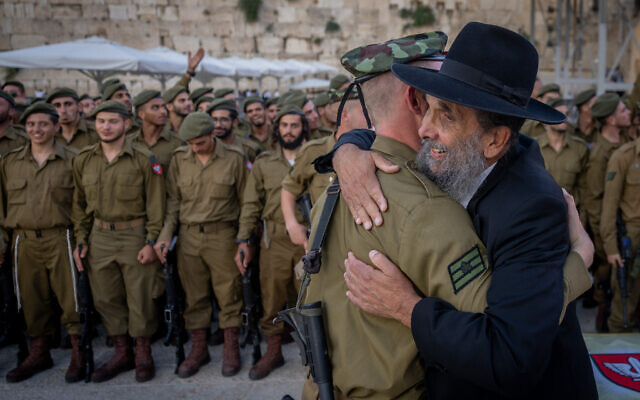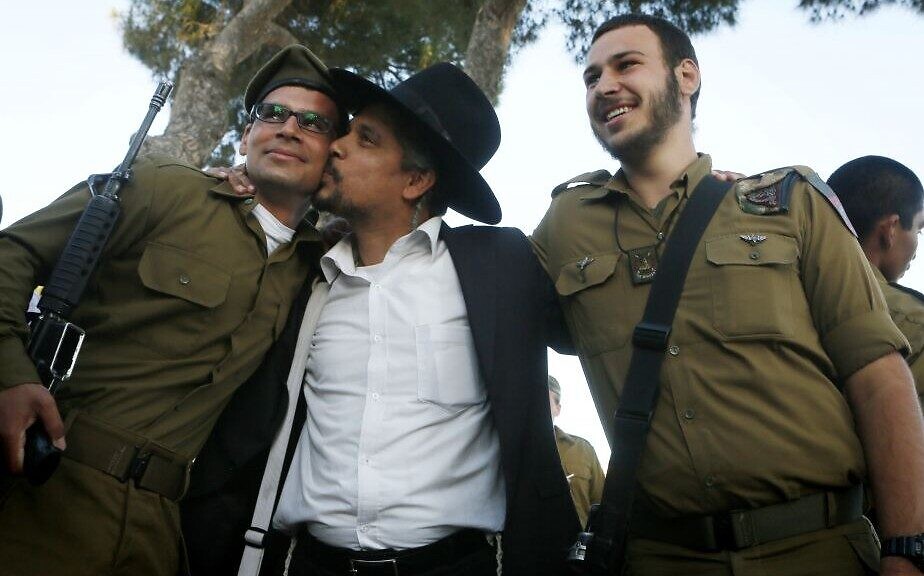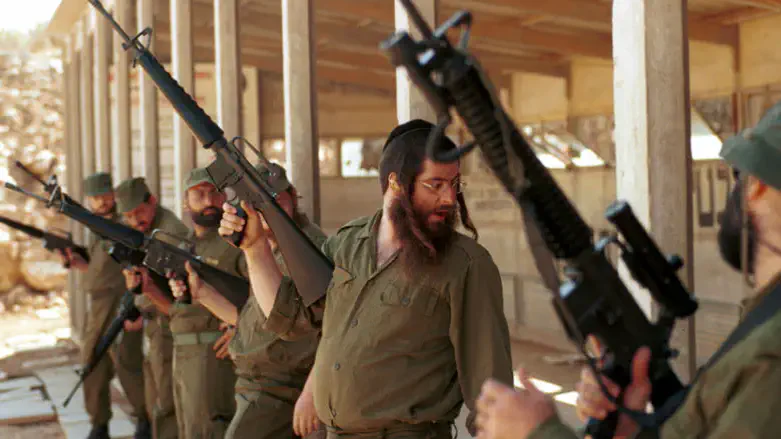"My brothers, do not commit this wrongful act"
All
the arguments of the haredi world cannot stand up to the simple fact
that Jewish lives are on the line in Israel as never before and the army
must increase the number of combat soldiers asap.
Gedalia Zurger (not
his real name) is an avrech (married kollel student) in Bnai Brak.
Article translated from Makor Rishon by Rochel Sylvetsky.
To
arouse someone who has lost consciousness, sometimes the best thing to
do is to slap him in the face. The articles published in the Hebrew
press recently, especially one by a haredi writer last week titled “The
Religious-Zionist Conceptsia” was a slap in the face to our
consciousness. And that article was but one of an entire series of
articles, statements and comments by talking heads, all coming from the
haredi side of the dispute. And that is why I have written this article.
The
prevarications were never as clear as they are now. After seventy-five
years of hearing the haredi community, to which I have belonged all my
life, tell everyone that they are an integral part of the nation, that
they see all Jews as brothers, and that in their world view, they are
fighting with them shoulder to shoulder, except that they do battle by
learning Torah – the sad truth has been revealed. You probably think
that the argument centers around “[the Torah] protects and saves”
(“magna umatzla”, Tractate Sota 21) and “rabbis do not need protection”
(“Rabbanan la tsrichei netiruta,” Tractate Bava Batra) but I have news
for you. That was never the real issue.
So, can someone explain
to us what the argument is all about? Not really. It seems that every
haredi spokesperson can take the argument to any place he wishes.
According
to the aforementioned article, the crux of the issue is opposition to
the Zionist ethos. Its author writes that Religious Zionism has an
ethos, a “conceptsia” in his words, and that in his view, there is an
ongoing debate about whose “conceptsia” is the right one.
What
really happens is that Religious Zionist rabbis open the Talmud,
Maimonides, and other sources to try to understand if the Torah really
does “protect and save” without the necessity of enlisting in the army
or whether “even a bridegroom must leave his room and a bride her
chuppah,” as is the halakha in case of a war to save the Jewish people
from those who attempt to destroy them. They write letters and publish
learned explanations, quote sources with exacting accuracy – only to
discover that the other side is not only bored - but mocking.
The
haredi side wants to avoid discussion and never actually intended to
debate the issue seriously. More insulting is that those bringing the
haredi point of view are in most cases journalists and spokesmen who are
total ignoramuses when it comes to Torah. Their only talents lie in the
political and verbal realms. The truth is that the real Religious
Zionist “conceptsia” is that sector’s sincere desire to have a serious
discussion on the matter – while the haredim avoid it like the plague.
Self-deception
Let
us analyze the various haredi claims and present a condensed version of
the statements that are the most common. It turns out that the haredi
rhetoric we have been subject to lately is disingenuous, to say the
least.
This is how the arguments unfold: First the haredi speaker
proclaims that the Holy Torah guards the Jewish People. (There is no
Religious Zionist argument with that.) Sometimes he adds an emotional
element: "Do you know how hard it is to learn Torah ten hours a day?"
The person who must contend with this argument is usually a
non-religious broadcaster with absolutely no Torah background. His
intuition tells him that there is something wrong here, but he is
incapable of discussing the “protects and saves” Talmudic dictum in any
depth.
That forces him to take another tack: “And what about those
who aren’t learning?” This is when the deception comes into play. The
more experienced politicians – generally from the soft edges of the Shas
party – nod their head and agree: “There is no question that those who
are not learning must enlist.” The secular broadcaster will repeat this,
as will other media. That is, until one of the haredi spiritual leaders
says: “G-d forbid, there is no way a haredi young man can enlist in the
IDF.” And they did say just that.
The more honest haredi spokespersons go on to the next stage and adopt a cultural approach: “The army is unsuitable for haredim. A
haredi young man who enters the army will not leave it a haredi.”
Seasoned broadcasters will protest: “but the Army is willing to create
separate frameworks to protect them,” to which the spokesmen retort: “If
and when that happens, there will be something to discuss.” Someone
usually comes and declares that “there is no chance of that happening.”
(However, although that was true in the past, the army has just made a
detailed haredi-oriented offer – so let us see what happens, R.S.)
Others will venture a different reason – one which once held water: “The army neither wants nor needs the haredim.” They
will usually quote some general or former CoS who said this, except
that it was before the cataclysmic reality prevailing since October 7th,
a time when Ehud Barak’s “small, smart army” concept was still an
accepted mantra. It is true that then, most Religious
Zionists saw it as a live-and-let-live issue, not necessitating haredi
participation in the army.
That, however, is not the case today.
So today, others add, in the same vein: “This does need rethinking, but
no one imagines that drafting haredim at this point will help the
country or affect the burden falling upon the reservists. Even if a
wholly haredi combat brigade were to be formed now, we all hope the
reservists will be back home by the time it finishes basic training. If
the goal is to ease the burden, wouldn’t it be more logical to try to
draft all the fighters who have already had training?" (This using the
incontrovertible fact that over 10,000 reservists have not been called
up for active service and adding the inexcusable fact that there are
tens of thousands of non-religious young men who avoid serving in the
army).
Of course, this means that for the foreseeable future, the
injustice done to the reservists can be allowed to continue, since if
the army refrains from drafting thousands of haredim now, in three
years’ time the haredim can say the same thing once again. The fact is,
that it really won’t help today’s reservists, but training haredim now
can certainly save those reservists in another year or two.
Simchat
Torah taught us that the concept of a “small, smart army” has gone up
in blood and fire, and that IDF needs large numbers of soldiers, in
regular service and as reservists. It needs the haredim, the reservists
who were not called up and the non-religious who avoided the draft as
well. And as the years pass, that need will only increase.
Better to have dropouts than to let the roots rot
The
above points are the ones used mostly when being interviewed by secular
media personalities, who admit that they are unable to counter them. If
a Torah verse is quoted, even one that angers the interviewer, he has
no basis for a counter argument and generally gives in, sometimes, most
unfortunately, feeling antipathy towards the Torah that is the source of
the quote.
However, when the contender is a Religious
Zionist, that is a different story. The haredi public finds itself in
some confusion when arguing with what it calls “mizrochnikim.” Many in
the haredi world realize that the level of Religious Zionist Torah
learning is no lower than theirs. Religious Zionist rabbis do not wear
long black coats for the most part and do not call themselves “Maran,”
but it is enough to listen to one short shiur (Torah lecture) to
understand that they can hold their own in Torah and fear of G-d. The
heroic stories of Talmidei Chachamim (Torah scholars), Ra”mim (Yeshiva
gemara teachers) and Dayanim (Religious Court judges) from the Religious
Zionist community who went into battle and literally endangered their
lives to save the Jewish people, cannot leave hearts unmoved.
When
arguing with “mizrochnikim” the whole format changes. They cannot be
quoted partial verses and Talmudic texts taken out of context. They know
how to back up their words with our Sages and the Rambam, and with
Tanakh verses that most haredi scholars have never studied. They
also prove by their very existence, that one can wear an IDF uniform
and stay G-d-fearing, that one can learn more than the average yeshiva
boy does in the breaks between battles.
At any rate, when facing
Religious Zionists, the discussion goes on to another level, as if to
admit that talking about “protecting and saving” will not work and that
saying that “we are following the instructions of our great rabbis”
won’t work either, because they are liable to ask for the reasons
justifying those statements. The haredi side then resorts to politics,
saying: You want the non-religious to like you, but that does not
happen. Look at you, dying like flies and the Chief of Staff and upper
IDF echelons are all leftists. The leftist media ignore your sacrifice
and even denigrate you.
Religious Zionists who believe in the
“conceptsia” that Jews have to sacrifice their lives to protect their
brothers because of the mitzva saying “do not stand idly by while your
brother’s blood is being shed” have a difficult time dealing with this
kind of cynical political outlook.
Some haredim, at this point,
criticize the entire Religious Zionist education system. “You hate us,”
they claim, and the ignorant among them dare to say that this is an
instance of the “unlearned hating Torah scholars” – the scholars being
those with black hats, and the unlearned being those well versed in
Tanach, Gemara, and clear Jewish hashkafa (Jewish philosophy).
On
the contrary, not only do the Religious Zionists not hate the haredi
sector, their youth, over the past few decades, look to the haredim for
whatever spiritual content they can glean from Hassidism (without being
involved in all the intrigues taking place in the various courtyards)
and can be found among those sitting on the Hassidic bleachers at
events. Religious Zionists quote the great thinkers and scholars of the
haredi world without any censorship. In Religious Zionist study halls,
you are apt to see students analyzing the points in the book “Vayoel
Moshe” by the Satmar Rebbe more than the Satmar Hassidim do. Talk of
“hatred” is totally out of place. It does not exist. (There is, however,
anger today, especially among parents of religious soldiers, R.S.)
The
haredim also use the numbers of Religious Zionists who have stopped
keeping the commandments as a weapon: “Perhaps you are right. But look
how many dropouts you have.” Without contradicting the inflated
percentages heard in these contexts, and without bringing up the growing
percentage of haredi dropouts, the Religious Zionists are much more
afraid that the entire tree of the state will rot and forget its
mission, turning that rot into an ideology.
Extremism and distancing
There is no way to avoid dealing with haredi opposition to the Zionist venture. One
can, however, mention how this is being said by a public which has held
decision making positions in that Zionist venture for at least forty
years, at the same time enjoying generous financial allocations as well
as welfare and health benefits that are way above its percentage of the
population and its contributions to the economy, while taking part in
cabinet meetings that decide on security issues without its children
taking part in the war effort.
When the state was founded, the
need for yeshiva exemptions was justifiable. Today the haredi sector
gets much more than its fair share. The “society of learners” that rose
up in the state of Israel has no precedent. It lives and breathes only
because of the Zionist venture that it scorns. The very fact that a
small cut in allocations causes the haredim to talk about the collapse
of the Torah world is the proof.
The haredi sector which saw
itself as the “mezuzah of the state” has not been fulfilling that
promise for decades. The feelings of shared responsibility and mutual
caring have disappeared. Not only is the claim that “we are learning
more during this period” not true – there were very few yeshivas that
cancelled their vacation “bein hazmanim” or stopped parties during the
war – they are not even trying to seem like they are part of the war
effort, continuing petty political maneuvers to get jobs and funding,
with no evidence of their rising to the great challenges of the hour.
But
all the above is part of an old dispute, it belongs to the time
preceding October 6th, or if you wish it, to Hoshana Rabba of this year.
All the concepts disintegrated on Simchat Torah. The theoretical arguments about Zionism or saying Hallel on Independence Day are irrelevant. We are facing a clear instance of pikuach nefesh,
saving lives. At a time that Jewish blood is being spilled like water,
no one can stand on the sidelines. Hundreds of soldiers have fallen,
thousands of orphans and widows have had their lives changed forever,
and they did not do this because of the sanctification of Zionism but
mainly in order to protect their brothers in Bnai Brak, Emanuel, Kiryat
Sefer and Beitar Ilit as well as the rest of the country.
And
don’t try to say that this is a “process” and that everything must be
done patiently through talking to one another. We do have the haredi
Netsach Yehuda and Nahal Haredi but they are a drop in the bucket. The
last seventy-five years have taught us that that the process is one of
distancing and more extremism. It is not the courts that severed the
connection between the state and the haredim, but the young haredi men
blocking roads shouting “we would rather die that be drafted”, or
treating soldiers as if they are beneath them and not saying the prayer
for their safety on Shabbat.
“Please, my brothers, do not commit
this wrongful act,” is a quote from the book of Genesis. Do not be taken
in by empty rhetoric. Religious Zionism cares about the Torah world no
less than the haredim, they too are willing to pay huge sums to preserve
their spiritual level and their children’s education, they too are
pained and worried by the religious dropout rate.
But they are
also pained and worried about the physical future of all of us and are
not willing to allow old arguments to divert attention from reality: “It
is a time of trouble for [the people of] Jacob” as the Prophet Jeremiah
said, and the Torah in Leviticus 19 commands us: “Do not stand idly by
when your neighbor’s blood is being spilled.”
https://www.israelnationalnews.com/news/392689?utm_source=activetrail&utm_medium=email&utm_campaign=nl


























